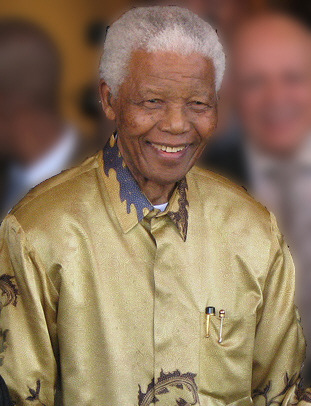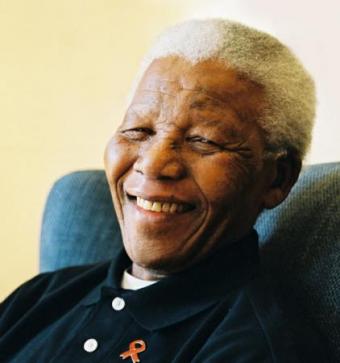“A courageous leader as activist, prisoner, statesman”
Brown President Christina Paxson issued the following statement on behalf of the Brown Community:
Brown University joins the global community in mourning the passage of Nelson Mandela. A courageous leader who committed his life to advancing justice for all people, President Mandela made lasting contributions — as an activist, prisoner, and statesman — to improving the human condition. Perhaps it was captured best in the citation that accompanied the awarding of his honorary Doctor of Laws degree in 2010:
“Tolerance. Respect. Integrity. Justice. Peace. These are just a few of the words that describe your character, and your impact on the world. You sacrificed and fought through words and deeds for the freedom of the people of South Africa, leading always by personal example and with grace and dignity that could not be ignored. … The world today is a more hopeful place for your presence in it and your life well lived. For that, we are deeply grateful."
May 30, 2010: Brown confers an honorary Doctor of Laws (LL.D.) on Nelson Mandela
Mandela was unable to travel to Providence in May 2010. Johnny Moloto of the South African embassy accepted the degree on his behalf. The text of the citation was presented in English and Latin:
Courage. Tolerance. Respect. Integrity. Justice. Peace. These are just a few of the words that describe your character, and your impact on the world. You sacrificed and fought through words and deeds for the freedom of the people of South Africa, leading always by personal example and with grace and dignity that could not be ignored. From within the high walls of Robben Island your unyielding commitment to the rights of all humans to live free of bondage was a beacon of hope to all corners of the globe. And twenty years ago, as you walked free from your unjust imprisonment, the peoples of all nations saw the power and strength of your resolve and the depth of your compassion. The world today is a more hopeful place for your presence in it and your life well lived. For that, we are deeply grateful. Brown University joins the chorus of your admirers in saluting your accomplishments, praying for your continued success, and welcoming you to the company of alumni of this international institution. We honor you with the degree of Doctor of Laws, honoris causa. (news release)
“The youngest old man on the planet”
Ted Widmer, assistant to the president for special projects at Brown, was a foreign policy speechwriter and senior adviser to President Bill Clinton between 1997 and 2001

One of the perks of being a speechwriter in the Clinton White House was the chance it gave to eavesdrop on history and encounter the great and near-great in close proximity. They did not come greater than Nelson Rolihlahla Mandela (Rolihlahla meant “troublemaker”). He inspired awe, not only for the dignity of his presence, but the power of his words. He spoke with considerable authority for the 20th century — he had seen more of it than most of the leaders of the 1990s and could speak to its failures as well as its successes. He was born in 1918, before World War One had finished its grim business, and he’d been deeply affected, in a way that few Americans could remember, by the words of Franklin Roosevelt, whose Atlantic Charter of 1941 had given the world a blueprint of human rights.
But Mandela also spoke for the new world coming into existence — the democratic world, inclusive, that American presidents had been predicting for some time but which had been blocked by slavery, colonialism, world war, cold war, and on a few occasions, by Americans themselves. It took some time before the modest protests against apartheid began on campuses like Brown’s and then spread and led to principled action against the regime in South Africa. In so many ways, we were sleepwalking. George H.W. Bush, a great foreign policy president in many ways, wrote a 587-page memoir about his presidency (with Brent Scowcroft) that did not mention Nelson Mandela once.
In 1990, the sudden appearance of this rarely photographed man seemed to herald a better time coming. Mandela’s release from his cell on Robben Island came fast upon the liberation happening in so many other parts of the world and only deepened the expectancy that a new time was beginning. It seemed to free all of us. Four years later, he cast the first vote of his life, on the day that he was elected president. Everything he did seemed fresh, often arrestingly so. He frustrated the left as well as the right, working toward reconciliation, forgiving and even praising his jailers. He was the youngest old man on the planet.
For all of these reasons, we revered him inside White House speechwriting. Now and then, we even glimpsed him. In 1998, Bill Clinton undertook a massive 11-day trip to Africa, by far the longest of any U.S. president, in no small part because of Mandela. His presence simply commanded a visit. Mandela had recently stepped down from the presidency, but he welcomed the sprawling American delegation to a dinner, spoke beautifully as always, and left everyone feeling as if history might actually turn out decently.
A couple years later, I was in an outer office of the West Wing, near the Roosevelt Room, when a door opened suddenly and Nelson Mandela appeared, seeking the exit. The West Wing is not very large, but it can get confusing. When he realized he had opened the wrong door, he beamed his famous smile, gave a friendly wave, and kept on his way, stubbornly refusing entreaties to help him find the way out.
Not a bad exit.

